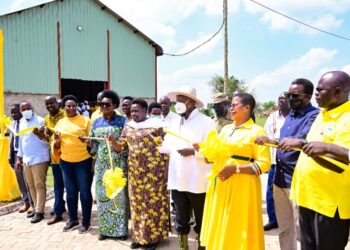A new research has revealed that three out of four Ugandans (75 per cent) now access water from an improved source including 19 per cent who have access to piped water.
These findings were released by Twaweza and the Uganda Water and Sanitation NGO Network (UWASNET) on Tuesday during the ninth National WASH CSO Forum 2019 in Kampala.
The brief titled “Leaving no one behind? Citizens’ views and experiences of water, sanitation and hygiene” is based on data collected from 1,845 respondents across Uganda between 24 June and 5 July, 2019 by Sauti za Wananchi, Africa’s first nationally representative high-frequency mobile phone survey.
Despite reasonably high levels of access to improved sources generally, the Sustainable Development Goals essentially call for access to piped water for all Ugandans.Given that currently one in five Ugandans access piped water, and that there is a wide variation between urban and rural areas as well as wealthier and poorer households, Uganda still has some way to go to achieve this target.
“There are significant disparities, particularly in terms of access to piped water, between urban [42 per cent piped] and rural [11 piped] areas, and poorer [8 per cent] and wealthier [45 per cent] households. Households with one or more disabled members are less likely to have access to piped water than other households [12 per cent , compared to 21 per cent],”the brief stated.
Additionally, the most commonly cited problems in accessing clean and safe water are; the lack of water points [36 per cent], the distance to water sources [27 per cent] and dirty water [25 per cent]. The two problems are cited by almost twice as many households in rural areas than urban. These issues, together with dirty water and broken water points, are more commonly cited by those in poorer households than in wealthier households. The cost of water is more often cited as a challenge in urban areas [21 per cent ] than in rural [8 per cent], and more often among residents of wealthier households [19 per cent] than poorer ones [5 per cent].
The report further stated that overall, four out of 10 Ugandans’ [40 per cent] access to clean and safe water has improved over the last 12 months.The same portion say their access has stayed the same [39 per cent] and twice the number that say their access has gotten worse [20 per cent].
Although, these findings are largely positive for the sector, there are areas for concern such as “One out of 20 households [six per cent] have a household member who suffered from dysentery in the past month, and one out of eight households [13 per cent] have a member who suffered from typhoid in the same period. Very few households [0.5 per cent] have ever experienced cholera. Again poorer and rural households are at s disadvantage:Poorer households in particular are twince as likely to have experienced a water related disease-typhoid [15 per cent versus 8 per cent] and dysentery [9 per cent versus 4 per cent] than wealthier ones.
Marie Nanyanzi of Sauti za Wananchi at Twaweza said although, there have been significant achievements in the water sector as seen in the reports from citizens, Uganda remains a long way off from achieving the Sustainable Development Goal targets on access to water.
“When we consider the stark variations between households, the picture becomes gloomier.Poorer, rural households are getting a raw deal; they spend more time collecting water, access imporved sources less and have less hygienic latrines. These access challenges are then compounded by the higher incidence of disease among these same types of households, meaning they will bear additional costs for healthcare as well.These data tell us that we are leaving many of our citizens behind; we need targeted and transformative interventions to esure that all Ugandans enjoy their right to clean and safe water and sanitation,” said Nanyanzi.
At the same event, Eng Joseph Oriono Eyatu, the Commissioner of rural water supply and sanitation at the Ministry of Water and Environment said everybody in rural areas;three out four people believe that their water situation has improved thus describing the achievement as remarkable.
“It shows that government is doing a good job, its working but we still have some small portion of the population not accessed and as per our theme today, we do not want to leave anybody behind, anybody who does not have access, its our promise and our responsibility to make sure they have access,” said Eng. Eyatu.
“Still we have access of 70 per cent as of published data and 66 per cent of all the rural villages have access to water but you realize that we still have about 36 per cent of the villages that do not have access to water which must solve. A number of people spend more than 30 minutes collecting water, this not acceptable and government recognizes this. That is why now we are trying to introduce solar energy which government has embraced and with a number of partners we are targeting that we power all those places which delay people from collecting water.”
Do you have a story in your community or an opinion to share with us: Email us at editorial@watchdoguganda.com











